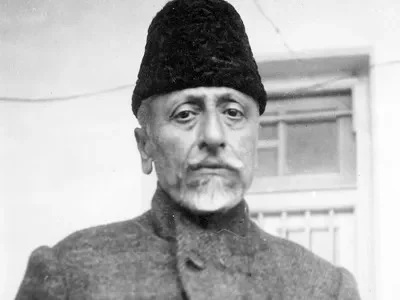On February 22nd, we commemorate the legacy of Maulana Azad, a towering figure in India’s struggle for independence, whose contributions continue to inspire generations.
Shoaibur Rahman
NEW DELHI– Today marks the death anniversary of Maulana Abul Kalam Azad, a luminary whose indelible mark on India’s history reverberates through time. Born on November 11, 1888, in Mecca, Maulana Azad emerged as one of the foremost leaders in the fight against British colonial rule. His multifaceted contributions, spanning politics, education, and social reform, solidify his place as an icon of India’s freedom movement.
Maulana Azad’s fervent advocacy for unity and religious harmony resonates profoundly in today’s diverse India. He staunchly believed in the country’s secular fabric, envisioning it as a tapestry woven with threads of pluralism and tolerance. His famous declaration that “Hindu-Muslim unity is not only desirable but is also essential for national survival” remains etched in the annals of history, serving as a guiding principle for communal amity.
One of Azad’s seminal achievements was his instrumental role in shaping the educational landscape of independent India. As the first Minister of Education, he laid the foundation for a robust and inclusive education system. His emphasis on fostering a scientific temper and promoting critical thinking underscores his progressive vision for the nation’s youth. Azad firmly believed that education was the cornerstone of societal progress, empowering individuals to chart their destinies and contribute meaningfully to the nation’s development.
In addition to his political and educational endeavors, Maulana Azad was a prolific writer and orator. His literary works, including his magnum opus “India Wins Freedom,” offer profound insights into the challenges and triumphs of the freedom struggle. Through his eloquent speeches and writings, Azad galvanized the masses, instilling in them a sense of pride in their heritage and a determination to secure their rights.
Reflecting on Azad’s legacy, historian Ramachandra Guha remarked, “[Azad] was not just a political leader; he was a visionary who foresaw the contours of a modern, democratic India.” Indeed, Maulana Azad’s vision transcended the confines of his time, encompassing a future where justice, equality, and fraternity prevailed.
Despite the passage of decades, Maulana Azad’s ideals remain as relevant as ever, serving as a beacon of hope in tumultuous times. As India grapples with myriad challenges, from communal discord to socio-economic disparities, Azad’s message of unity and inclusivity offers a guiding light. His steadfast commitment to pluralism reminds us of the imperative to embrace diversity as a strength rather than a weakness.
The commemoration of Maulana Azad’s death anniversary is not merely an act of remembrance but a reaffirmation of our collective commitment to his ideals. As we pay homage to this stalwart of India’s freedom movement, let us heed his call for unity, tolerance, and progress. For in Maulana Azad’s timeless words, we find inspiration to strive for a better tomorrow, where the principles of justice and fraternity reign supreme.

